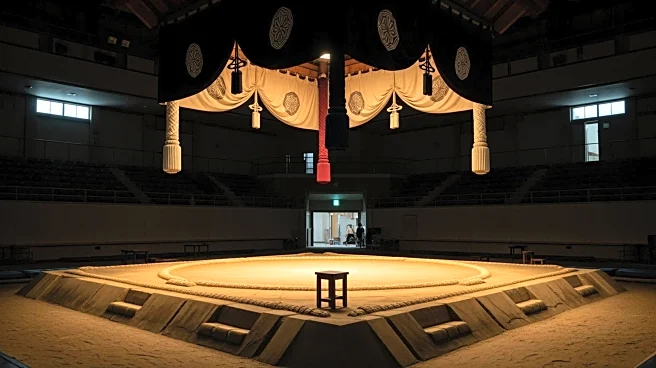What's Happening?
Sanae Takaichi, Japan's first female prime minister, is confronted with the traditional ban on women entering the sumo ring, a practice rooted in the belief that women are impure. This tradition has been
upheld even for high-ranking female officials, such as Mayumi Moriyama and Fusae Ohta, who were previously denied the opportunity to present trophies at sumo tournaments. Takaichi's stance aligns with the tradition, emphasizing the need to respect sumo's cultural heritage. The Japan Sumo Association has not received any request from Takaichi's office regarding her involvement, and the association maintains its mission to preserve the traditional culture of sumo.
Why It's Important?
The issue highlights the ongoing challenges faced by women in Japan, a country that ranks low in global gender equality indices. The tradition of excluding women from the sumo ring underscores broader societal norms that continue to limit women's roles in various sectors. As Japan's leader, Takaichi's approach to this cultural tradition could influence public discourse on gender equality and women's rights in Japan. The decision to uphold or challenge this tradition may impact Japan's international image, especially as it engages with global leaders at forums like the G20 summit.
What's Next?
Takaichi is expected to attend the G20 summit in South Africa, potentially sidestepping the sumo issue for now. However, the dilemma may resurface during the New Year's tournament in Tokyo. The Japanese government may need to address public and international scrutiny regarding gender equality and cultural traditions. Future decisions by Takaichi could set precedents for how Japan navigates traditional practices in the context of modern gender equality standards.
Beyond the Headlines
The sumo tradition reflects deeper cultural and religious beliefs rooted in Shinto, Japan's Indigenous religion. The preservation of such traditions poses ethical questions about balancing cultural heritage with contemporary values of equality and inclusivity. The international popularity of sumo, as seen in events like the Grand Sumo Tournament in London, raises questions about how these traditions are perceived globally and whether they will adapt to changing societal norms.











